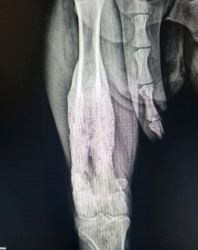The Value of an Informed Dog Owner

“Thank you for posting this information,” Martha commented on Facebook. “Our pointer ‘Liz’ was diagnosed with blastomycosis in the femur through a bone biopsy in 2019. She has been on medication since her diagnosis, and I am thankful to say she is doing well.”
The story of Liz’s illness and the challenges of diagnosing a fungal infection such as blastomycosis demonstrate why the AKC Canine Health Foundation (CHF) places high importance on educational outreach. An informed dog owner knows what is normal and abnormal for their dog(s) and understands the health risks relevant to their dog’s lifestyle. These owners can advocate for their dog’s health and work with their veterinary team when diagnosis and treatment decisions are not straightforward. Through educational articles, webinars, and infectious disease fact sheets - such as the Blastomycosis – Information for Dog Owners information that caught Martha’s eye – CHF offers resources to keep dog owners and veterinary professionals up-to-date on the latest breakthroughs in canine health research.
Liz's Story -
Liz is now a 5-year-old Pointer. She was destined to be a field champion. However, after training in South Dakota and then Georgia in 2019, Liz returned home to Kentucky a very sick dog. The cause of a persistent lameness in her right rear leg could not be determined. X-rays showed severe changes to her femur (thigh bone) and bone cancer was suspected. But Liz’s owner, Martha, felt that something wasn’t quite right.
As an informed dog owner and registered nurse, Martha knew that their home state and regions where Liz had been training were high-risk areas for the infectious fungal organism Blastomyces dermatitidis. The resulting disease, known as blastomycosis, causes non-specific signs such as lethargy, fever, weight loss and lack of appetite. Additional signs such as coughing/sneezing, limping, skin lesions, etc. are possible depending on where the fungal organism has taken hold in the body.

Liz had numerous laboratory tests performed, but none were able to detect the cause of her illness. Finally, a bone biopsy was taken from her abnormal femur and blastomycosis was diagnosed. “I honestly did not think that Liz would survive the trip back home as she was very ill by this point,” recalls Martha. “The veterinary specialist said that he had only seen this type of infection a couple of times in his career of more than 40 years!”
Liz was treated with oral anti-fungal medication and slowly began to improve. She will likely require life-long medication but is now living a normal and active life. Her owners have decided to retire her from field training. However, she is now trying several other dog sports including Fast CAT and scent work.
Liz’s owner, Martha, has been training and competing with dogs in numerous sports and active with her local kennel club for over 20 years. She has supported the AKC Canine Health Foundation through fundraisers and participation in research studies. As a registered nurse and clinical educator in the labor and delivery unit of her local hospital, her unique perspective has made Martha passionate about evidence-based medicine for both human and canine patients. “Canine health research is important in helping us provide the best possible treatment and care for our canine companions,” Martha says. “I feel that providing education on health topics through information gained from research provides valuable up-to-date information to clinicians and owners about treatment and care of their companions.”
The AKC Canine Health Foundation is committed to finding and funding studies with the most potential to advance the health of dogs, and to sharing the outcomes of those studies with dog owners and veterinary professionals. Explore our infectious disease fact sheets at akcchf.org/factsheets and all of our educational resources at akcchf.org/library. Working together, we can help all dogs live longer, healthier lives.
Thank you to Martha and Liz for sharing their story. We wish you many more years of health and fun!
You can follow their story on Facebook at Liz's Journey Through Blastomycosis.
Help Future Generations of Dogs
Participate in canine health research by providing samples or by enrolling in a clinical trial. Samples are needed from healthy dogs and dogs affected by specific diseases.



